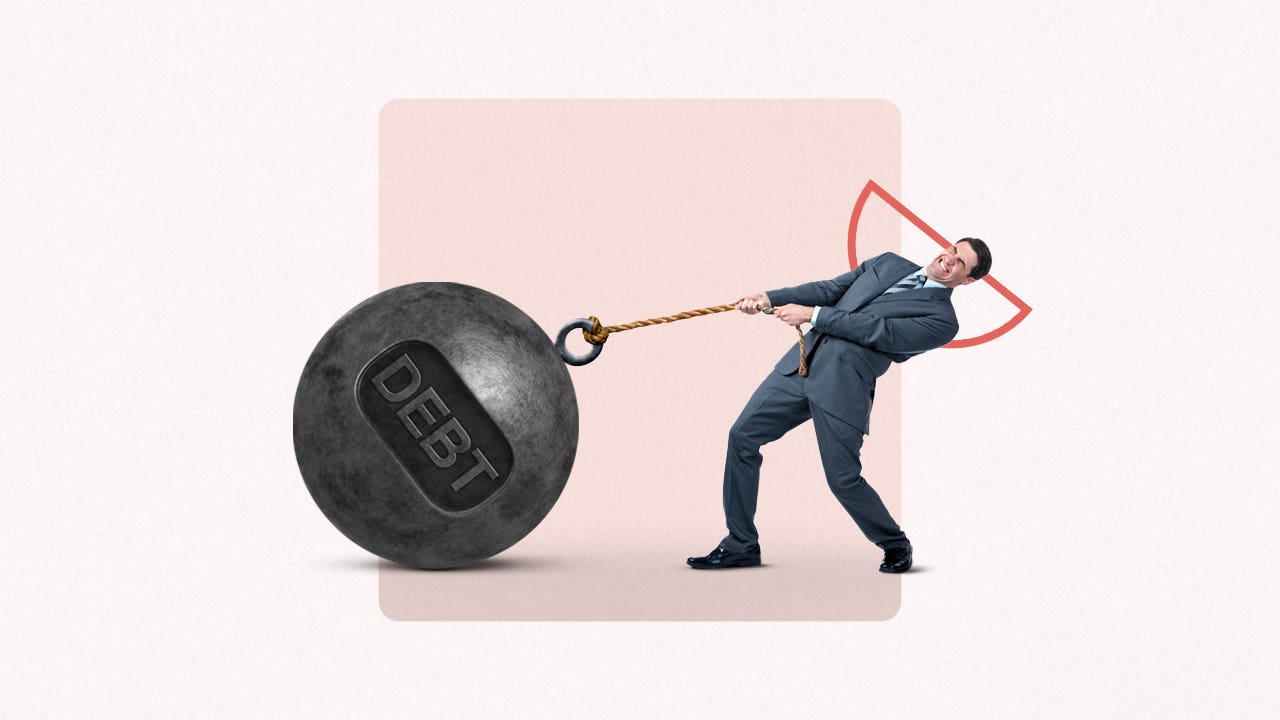How debt consolidation loans work

Key takeaways
- A debt consolidation loan replaces multiple streams of debt with one new loan at a fixed rate and monthly payment.
- A personal loan for debt consolidation is typically a fast and simple way to consolidate all kinds of debt.
- Debt consolidation loans may boost your credit scores if you use them to pay off credit cards.
A debt consolidation loan is a personal loan used to pay off several debts. It’s one of the more popular debt relief methods borrowers choose to streamline their budgets and save money on interest.
Some debt consolidation lenders even simplify the process by paying off creditors on your behalf. Other lenders let you use the funds to repay your debts on your own.
Understanding how these loans work and learning the steps to choose the best terms can help you decide whether a debt consolidation loan is the best choice to accomplish your financial goals.
What is debt consolidation?
The term “debt consolidation” refers to the process of combining multiple loans into a single debt. Consumers typically turn to debt consolidation to pay off credit cards or simplify their monthly bills.
Debt consolidation loans are installment loans specifically used to combine multiple debts into a single loan with a fixed monthly payment. You receive all the funds at once, and can choose repayment terms as short as one year or as long as 10 years.
Loan amounts commonly range from $1,000 to $50,000, although some lenders offer amounts as high as $100,000. Most debt consolidation loans are unsecured (no collateral needed), and funds are typically available within one business day of approval.
How does debt consolidation work?
The first step with any debt consolidation loan is to decide how much debt you want to consolidate. It usually doesn’t make sense to consolidate debt unless you can get a lower rate.
Let’s say you’re consolidating credit card debt with the following balances and APRs:
- Card 1 has a balance of $5,000 with an APR of 20 percent.
- Card 2 has a balance of $2,000 with an APR of 25 percent.
- Card 3 has a balance of $1,000 with an APR of 16 percent.
If you continue making the minimum payments on your credit cards, you’d pay $218.33 a month, and it would take a whopping 23 years to zero your final balance. Suppose you qualified for an $8,000 debt consolidation loan with a 24-month term at 10 percent, or a 60-month term at 12 percent. Either loan option can help you save on interest and become debt-free sooner.
| Minimum payment | Total interest | Months until payoff | |
|---|---|---|---|
| Credit card 1 | $133.33 | $7,723.49 | 277 months |
| Credit card 2 | $61.67 | $3,485.70 | 196 months |
| Credit card 3 | $23.33 | $792.87 | 108 months |
| 24-month debt consolidation loan | $369 | $859.93 | 24 months |
| 60-month debt consolidation loan | $178 | $2,198.58 | 60 months |
What the numbers mean
- If you pay your credit cards separately and make only the minimum payments, you’ll pay over $12,000 in total interest.
- If you choose the 5-year debt consolidation loan, your monthly payment will drop by $40.33, you’ll save over $9,800 in total interest and your debt will be paid off in 60 months.
- If you can afford the $150 monthly payment increase, a 2-year repayment term would save you over $11,000 in total interest.
To calculate your potential savings through consolidation, use a credit card payoff calculator and a personal loan calculator.

The best debt consolidation loans of 2025
Compare Bankrate's top lenders to find the loan with the lowest rates and flexible repayment terms.
Learn moreHow to tell if a debt consolidation loan is right for you
A debt consolidation loan is generally a good idea in these scenarios:
- You have significant debt. A debt consolidation loan may be able to help you pay the balances off and get your budget under control.
- You want a single monthly payment. Instead of scrambling to pay several debts by their various due dates, you’ll only pay one creditor each month. This could help you avoid late payment fees and adverse credit reporting.
- You can lower your monthly payments with an extended term. Keep in mind that a longer term, especially when coupled with a higher rate, can translate to higher overall borrowing costs — but you may decide the trade off is worthwhile to create breathing room in your budget.
If your income varies due to commission, tips or self-employment, a debt consolidation loan’s fixed monthly payment could strain your budget if you have an extended period of low earnings.
Bankrate staff insights
How to get a debt consolidation loan
The process for getting a debt consolidation loan isn’t very different from getting a traditional personal loan. The lender will examine your income and total debt, and pull your credit reports to determine what rate you’ll be offered. However, there are a few extra steps involved when you’re consolidating debt.
- Decide which debt you want to consolidate. Make note of the current balances of all the credit cards, unsecured loans, medical bills and other debts you want to consolidate. Online balances are usually more accurate than credit card monitoring services.
- Crunch the numbers. Compare short and longer repayment terms to decide which payment best fits your budget. Remember: Unlike credit cards, you won’t have a minimum payment option — be sure the payment is affordable.
- Organize the debt payoff information for each creditor. The process for paying off a credit card or other types of loan may vary, so gather all the information ahead of time. Depending on the lender (and the size of your loan), you may have access to your funds as soon as the same day you apply. The longer you wait to pay the debt off, the more interest accrues.
- Decide who is going to pay off the creditors. Some lenders, like Happy Money, handle debt repayment on your behalf. You may even get a rate discount if you let the lender do the payoff work for you. But direct creditor repayment may take a few weeks, so keep an eye on your accounts to ensure you don’t inadvertently miss a payment due date.
- Shop around and get prequalified. Most borrowers save money by comparing at least three different lenders to be sure they’re getting the best deal. Prioritize lenders that allow you to prequalify for a personal loan so you can compare rates without damaging your credit.
Bankrate’s take: The best way to maximize your credit scores after a credit card debt consolidation loan is to avoid using revolving credit in the future. If you’re considering using credit for a purchase, run the numbers through a personal loan calculator to estimate the potential monthly payment. You might reconsider the purchase if you see what the payment looks like over a 12- to 24-month term.
Alternative debt consolidation options
If you want to consolidate debt without a loan, you have options, including ones that don’t require taking on new debt. You can also combine different tactics, like using a balance transfer credit card for half of your debt and then paying down the remaining cards with the snowball method.
- Balance transfer credit card: A 0 percent balance transfer card allows you to consolidate several cards into a new one with no interest payments for a set introductory period, typically 12 to 21 months. Issuers may limit the maximum amount you can transfer and typically charge a transfer fee between 3 and 5 percent. Plus, you typically need good-to-excellent credit to qualify.
- 401(k) loans: You may be able to borrow up to $50,000 with a 401(k) loan, depending on your plan. You won’t need a credit check and have five years to repay the balance. However, the borrowed money doesn’t grow in your portfolio, and you may have to pay taxes and penalties if you switch jobs while the balance is outstanding.
- Borrow against your home equity: The three most common methods to tap your home’s equity — home equity loans, HELOCs and cash-out refinancing — can be low-interest ways to borrow the funds you need to consolidate debt. But it’s important to understand that each of these options is secured by your home, and if you default on the loan, you risk foreclosure.
- Debt snowball payoff method: As an alternative way to pay off debt, this strategy involves paying more than the minimum toward the debt with the lowest balance, while making minimum payments on the others. As each debt is paid off, you move to the next lowest balance, until all the debts are paid in full. This method is great for building motivation, since tackling the smallest balance first leads to an early “win.”
- Debt avalanche payoff method: With this option, you focus on paying off the highest-APR debts first, while making minimum payments on the others. Starting with the highest-interest debt can help you save more money on interest (compared to debt snowball).
Bottom line
A debt consolidation loan can be an excellent tool for reigning in credit card debt and reducing the stress of your monthly bill-paying schedule. The fixed payment term gives you a definite payoff date for your debt, setting you on a path to more debt freedom.
However, it’s only one of several debt consolidation methods and is best if used when you qualify for a low interest rate. If you find yourself turning to debt consolidation loans regularly, it may be time to schedule an appointment with a credit counselor to discuss how you can get out of the recurring cycle of debt.
Why we ask for feedback Your feedback helps us improve our content and services. It takes less than a minute to complete.
Your responses are anonymous and will only be used for improving our website.









